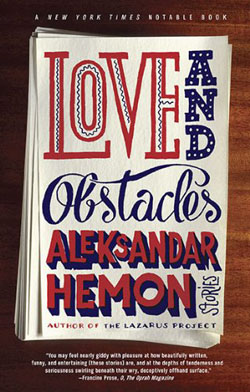Love and Obstacles
by Aleksander Hemon
reviewed by Max Ross
In his previous work, Aleksandar Hemon sometimes approached the English language like a classical pianist discovering jazz for the first time—while technically trained, he was getting a taste of improvisational freedom. One character in his book The Lazarus Project, “Would push a pea around his plate ponderously”; “birch branches beyond the bus” slumped, forlorn. With Love and Obstacles, Hemon’s fourth book, he’s settled down a bit. The language, while still vibrant and surprising, is more straightforward. Here Hemon continues to prove that he’s not just a clever wordsmith, but a powerful weaver of themes and metaphors, which is to say, a powerful storyteller.
The tale of how Hemon became an American writer is by now pretty well known: in 1992, when he was visiting Chicago, civil war broke out in his native Sarajevo and it was impossible for him to return home. Hemon set himself a limit of five years to learn English and start writing in it. By 1995, he began publishing his fiction in the United States.
The narrator of the linked short stories in Love and Obstacles has a past that closely resembles that of the author. “My story is boring,” he says in “The Conductor.” “I was not in Sarajevo when the war began; I felt helplessness and guilt as I watched the destruction of my hometown on TV; I lived in America.” In “The Noble Truths of Suffering,” the narrator describes how “I introduced myself and proceeded to deliver the usual, well-rehearsed story of displacement and writing in English.”
The narrator, who remains nameless, is an immigrant poet living in Chicago and recounting tales of his past. There’s a definite arc, as we witness him becoming more Americanized—more self-conscious, more wasteful, more wasted, more boastful—over the course of the stories.
The collection opens when the narrator is sixteen, and his family is spending a summer in Africa, where his father is a diplomat; the narrator falls in love with a blackjack dealer, but fails to woo her despite her possible affection for him. Then we’re in Sarajevo, as the narrator is sent on a mission across the country to purchase a refrigerator for his family, a large wad of cash in his pocket, a pair of thuggish characters in his train car. The third story begins in a Bosnian poets’ society, but ends in the United States with the poet’s dignity gone and not even worth mourning. From there we’re more or less in Chicago—the narrator lamenting and loving his past—until, in the eighth and final story, he returns to Sarajevo, only to feel like an outsider there.
No matter where he is, or how old, or how American, the narrator can’t escape a certain feeling of emptiness. Hemon’s most prominent theme might be described as the meaningless meaning of life. This has been a preoccupation in his earlier writing, too. Jozef Pronek, one of the author’s recurring characters, ponders his existence in Hemon’s first collection, The Question of Bruno:
He realized, schlepping through the goo and yuck of wet April snow, that he was utterly superfluous walking down the Magnificent Mile, that everything would be exactly the same if the space his body occupied at that moment were empty.
In The Lazarus Project, the narrator, a writer, remarks that, “The world would be exactly the same with my book as without it.”
Here the message is equally stark. “Most human lives perish without other people’s ever noticing,” the narrator of Love and Obstacles says. “And I recognized that it could happen to me too.” The phrasing morphs—one time it’s a group of birds “atwitter in a paroxysm of meaningless life”; another time it’s Rimbaud’s “What will become of the world when you leave? No matter what happens, no trace of now will remain”—but the underlying despair is always present.
Somehow, though, Hemon makes it upbeat, affirming. The suffering is universal, and so there’s solidarity in that. It’s kind of like saying, “Yeah, maybe we don’t matter. But that doesn’t matter, either.” It’s an idea that isn’t simply repeated but developed over the course of the book in stories that, while they certainly can stand alone, feel like a cohesive unit—like a novel—that is meant to be ingested whole.
Published on March 6, 2015

